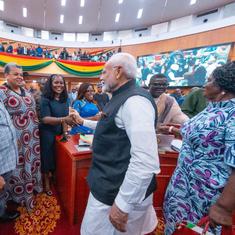Since Jharkhand was formed in 2000, only one chief minister has ever completed a full five-year term. Few observers who follow the state are willing to bet on current chief minister Hemant Soren being the second.
Not surprisingly, perhaps, since the Jharkhand Mukti Morcha leader is facing trouble on several accounts. The Jharkhand high court in July greenlighted a petition that seeks an investigation into accusations of money laundering by Soren.
In addition, the Election Commission is adjudicating a case in which he is accused of violating the office of profit rules by allotting a mining lease to himself.
There’s turbulence within the government too: the Jharkhand Mukti Morcha’s relationship with the Congress, a junior alliance partner, has betrayed unmistakable signs of strain in recent times.
To make matters worse, he has to contend with all of this without the help one of his closest aides – who is in jail, having been arrested by the Enforcement Directorate.
A BJP hand?
The fact that Soren is under siege on so many fronts at the same time may not be just coincidence, say political observers and leaders of the ruling parties. The ruling alliance of the Jharkhand Mukti Morcha, the Congress and the Rashtriya Lok Dal have only a slender majority in the 81-member state Assembly – making it fertile territory for the Bharatiya Janata Party, with 25 MLAs, to step in in case of a tumult.
“The BJP has been trying to destabilise the government ever since it came to power,” alleged Rajesh Thakur, the Congress’ Jharkhand unit chief.
In July, the Bengal BJP leader Suvendhu Adhikari admitted to this, saying that the BJP would “change” the government in Jharkhand as it had in Maharashtra – where legislators from the Shiv Sena broke ranks with the party in June to side with the BJP. This led to the three-member ruling coalition being toppled.
However, the BJP’s Jharkhand chief, Deepak Prakash, dismissed the idea that the party would attempt such an exercise in the state. “The government has failed and it is trying to divert attention by blaming us,” he said.

The Enforcement Directorate arrives
Nonetheless, the similarities between events in Maharashtra and those unfolding in Jharkhand are difficult to ignore.
In Maharashtra, the fear of Enforcement Directorate action is widely alleged to have played a role in prompting the Shiv Sena MLAs to rebel and form an alliance with the BJP. In Jharkhand, too, the storm, in some ways, was kicked off by the agency.
While Soren was already facing the heat for allegedly awarding himself a mining licence, the Enforcement Directorate in May arrested the state’s mining secretary Pooja Singal following several raids across the state. While Singhal was arrested for alleged irregularities dating back between 2008 and 2011 – a substantial chunk of which Jharkhand was under presidential rule – the message being sent out was loud and clear. In response, Soren dismissed the Enforcement Directorate’s actions as “mere threats”.
The Enforcement Directorate upped the ante. In May, it submitted to the Jharkhand High Court a sealed-cover report supposedly containing fresh findings in the case following Singhal’s arrested. This was done as the high court was hearing a separate matter – to which the agency was not a party at all – pertaining to a bunch of petitions seeking investigations into Soren’s role in three alleged instances of corruption. One of the petitions was related to Singhal’s case – the petitioner had questioned the state government’s inaction against Singhal.
Then in July, the agency arrested one of Soren’s closest political aides, Pankaj Mishra, on money-laundering charges linked to alleged illegal mining in the state.
The Enforcement Directorate’s pressure on Soren continues to build: his press advisor, Abhishek Prasad, is being questioned by the agency in the same case.

An uneasy alliance
As all of this was unfolding, Soren was also negotiating a fraying relationship with the Congress. The grand old party had taken objection to the Jharkhand Mukti Morcha purportedly not consulting it while nominating a candidate to the Rajya Sabha from the state.
The tensions between the two coalition partners escalated when the Jharkhand Mukti Morcha decided against backing Yashwant Sinha, the Opposition’s consensus candidate, in the presidential election, following a meeting with Union home minister Amit Shah.
A meeting and an election
Murmurs about Soren extending an olive branch to the BJP abounded after the meeting. Soren, though, insisted that the get-together was unrelated to the subject of the election and that the party’s decision to support Draupadi Murmu, now the country’s president, was on the account of Murmu’s tribal identity.
Not everyone was convinced: in the 2012 presidential elections, the Jharkhand Mukti Morcha had voted against the late PA Sangma, who was also a tribal leader.
While senior leaders from both parties claim that the alliance continues to hold well enough – the Jharkhand Mukti Morcha has pledged support to the Congress’s Margraret Alva for the post of the vice-president – the government is far from being free of trouble.
Bribery allegations
This was abundantly on display when the West Bengal police on July 30 apprehended three Congress MLAs from the state, after allegedly recovering “almost Rs 50 lakh” from their vehicle.
The arrests followed a police complaint by a fourth Congress MLA who had alleged that his three colleagues had offered to bribe him an amount of Rs 10 crore “to topple the government” at the behest of Assam chief minister Himanta Biswa Sarma.
Incidentally, the rebel Shiv Sena MLAs from Maharashtra had taken shelter in a hotel in Guwahati for eight days before flying out to another BJP state, Goa, where they formally announced they were forming a government with the saffron party.
A senior Congress leader from Jharkhand said that a plan to topple the government had been in the works for a while – and it involved not just legislators from the Congress but also from the Jharkhand Mukti Morcha. “Before the arrests, there was a plan to bring in a no-confidence motion,” he said. “The idea was for some Congressmen to support the motion and the JMM people to abstain.”
But the Congress leadership, he claimed, got wind of the plan and managed to convince the dissident MLAs against taking part in it.
The Congress’ many woes
However, conversations with senior Congress leaders suggest that the discontentment runs deep. The state’s finance minister and senior Congress leader Rameshwar Oraon made no efforts to hide his displeasure with the state of affairs. “It is clear that the party has failed to address the concerns of its legislators,” said Oraon. “It is incumbent upon the senior leaders to make sure everyone is on the same page, which clearly they have failed at.”
The Congress’s struggles, though, may not just be limited to keeping its flock together. Its increasingly weakening position across India may not inspire confidence in the Jharkhand Mukti Morcha of the party’s ability to be a reliable ally in its time of crisis.
Will the tables turn?
While Soren publicly takes a belligerent position against the BJP, the party’s other leaders have a more temperate stand. General Secretary Supriyo Bhattacharya said it would do “whatever has to be done” to serve the people of Jharkhand”. When asked if that included sided with the BJP, Bhattacharya said, “That question doesn’t arise now,”
However, he added, “In future, you can never say in politics.”
Observers say a Mukti Morcha-BJP alliance even in the not-so-distant future is certainly in the realm of possibility. After all, the two parties have come together in the past too.
“The fact that they are supporting Alva for vice-president means Soren hasn’t given up yet,“ said Faisal Anurag, a veteran journalist and political commentator from the state. “But I don’t know how long he will be able to continue to resist given the pressures.”










